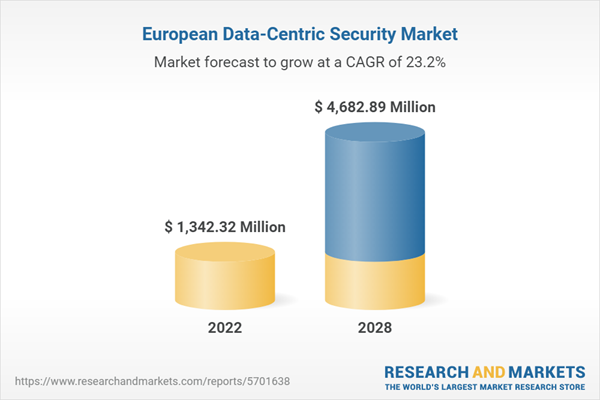Data protection rules and regulations changed over the decade owing to the incorporation of smart technologies and new working models among the companies. Several news reforms and infrastructure are demanding modern techniques of data protection. The Swiss Data Protection Act (DSG) was revised in September 2020 (revFADP) to include stricter provisions focused on protecting the privacy rights of personal data during processing. It is expected to enter into force in 2022. Additionally, some new provisions are very similar to their GDPR counterparts. These include the right to be forgotten, the right to data portability, the requirement for periodic Data Protection Impact Assessments (DPIA), and reporting obligations in the event of a breach. Thus, the growing stringent rules pushed organizations towards more data-centric security approaches, is driving the market growth.
Market Overview
The Europe data-centric security market is spread across Germany, France, Russia, the UK, Italy, and the rest of Europe. The adoption of data-centric security solutions is expected to increase as internet penetration increases in major European countries. In addition, expanding wireless networks serving mobile devices has increased data vulnerability. Implementing EU legislation and actions rooted in the National Framework and the National Cybersecurity Plan is expected to facilitate the market's growth in the region. Since the publication in 2018 of the EU- General Data Protection Regulation (GDPR), new regulations have emerged in different countries to protect the personal data that organizations collect from employees, partners, customers, and other sources. The GDPR sets a high standard for consent, which will hugely impact the marketing industry. As part of its digital strategy, the Italian Government plans to invest significantly in the protection of digital identities to increase the security level of digital transactions and, subsequently, to strengthen consumers' trust by protecting citizens' identities. In addition, telecommunication companies are increasing their investment in data-centric security to deal with rapidly increasing data threats. For instance, Telefonica came up with Telefonica Tech Ventures in 2020 to seek strategic start-ups and develop its investment capabilities to invest in markets for Telefonica in Germany and other European countries. Each of these factors is expected to impact the growth of the European data-centric security market in the coming years.Europe Data-Centric Security Market Segmentation
The Europe data-centric security market is segmented into component, deployment mode, organization size, verticals, and country.- Based on component, the market is bifurcated into solution and service. The service segment is expected to register the larger market share in 2022.
- Based on deployment mode, the Europe data-centric-security market is segmented into cloud-based and on-premises. The cloud-based segment is projected to hold a larger market share in 2022. On the basis of organization size, the data-centric security market is segmented into small and medium enterprises and large enterprises. In 2022, the large enterprises is expected to hold the largest market share.
- Based on country, the market is segmented into France, Germany, Italy, UK, Russia, and the Rest of Europe. The UK dominated the market share in 2022. Broadcom Corporation, Forcepoint, IBM Corporation, Imperva, Informatica Corporation, Micro Focus, NetApp, Orange Cyberdefense, Talend, and Varonis are the leading companies operating in the data-centric security market in the region.
Table of Contents
Companies Mentioned
- Broadcom Corporation
- Forcepoint
- Ibm Corporation
- Imperva
- Informatica Corporation
- Micro Focus
- Netapp
- Orange Cyberdefense
- Talend
- Varonis
Table Information
| Report Attribute | Details |
|---|---|
| No. of Pages | 130 |
| Published | November 2022 |
| Forecast Period | 2022 - 2028 |
| Estimated Market Value ( $ | $ 1342.32 Million |
| Forecasted Market Value ( $ | $ 4682.89 Million |
| Compound Annual Growth Rate | 23.2% |
| Regions Covered | Europe |
| No. of Companies Mentioned | 10 |









